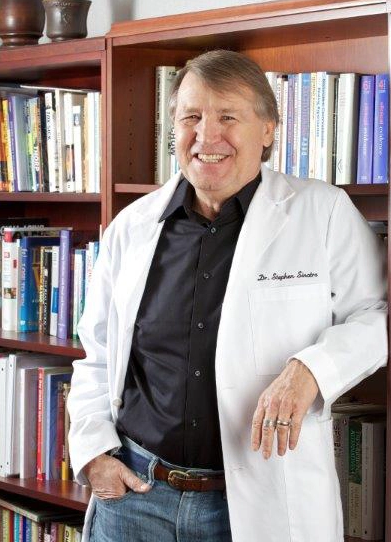
October 15, 1946 — June 19, 2022
We at Holistic Primary Care are saddened to learn of the passing of Dr. Stephen Sinatra, on Father’s Day 2022, just four months shy of his 76th birthday.
A trailblazer in the field of metabolic cardiology, Dr. Sinatra was an exemplary physician, healer, and teacher. Though trained in the conventional biomedical paradigm, he realized early on that the power of reductionism is best leveraged when its analytical methods are brought into a comprehensive “big-picture” perspective.
In his work with patients and in his writings, Sinatra advocated a broad range of modalities. He used drugs when truly appropriate, but also saw their limitations. He emphasized the role of nutrition, toxin elimination, and stress reduction for reversing disease and engendering health.
Throughout his career, he maintained an open mind and a willingness to challenge medical dogma. But he did so without becoming a zealot for any particular mode of treatment.
“The Achilles heel of any healer or any healing system is rigidity. Any good healer can see the good in any modality. You need to be open to facts and use whatever works. Don’t get married to your modalities,” Dr. Sinatra said in a 2013 interview, which I wove into a story titled When Questioning Clinical Dogma Is a Doctor’s Duty.
Born in New York City in 1946, Stephen Sinatra earned his MD from Albany Medical College and was board certified by the American Board of Internal Medicine and the American College of Cardiology. By the mid-1970s he was well on his way to a successful career in conventional cardiology. He served as attending physician at Manchester Memorial Hospital in Connecticut, later becoming that center’s chief of cardiology and director of medical education. He also ran the hospital’s echocardiography, cardiac rehab, and weight-reducing programs.
He was, in his own words, “a cholesterol choirboy,” adhering to the doctrine that high cholesterol was the prime cause of heart disease, and the newly minted statin drugs were the “cure.”
“I was a paid consultant to some of the biggest statin manufacturers, and I was making $1,000 for every 30-minute statin lecture that I gave. At the time, based on the research, the cholesterol hypothesis made total sense.”
But by the mid-90s, Sinatra was seeing things among his own patients and reading studies that didn’t fit the “cholesterol bad, statins good” doctrine:
- Angiograms showing perfectly clean coronary arteries in patients with total cholesterol levels well over 280 mg/dl.
- Patients with cholesterol below 150 who ended up hospitalized with myocardial infarctions.
- Patients who complained of memory problems, depression, and cognitive dysfunction within months of going on these allegedly safe and life-saving drugs.
The Lyon Diet Heart Study, published in 1994, was a major epiphany for Sinatra. It showed that a Mediterranean-style diet could reduce CVD mortality by 76% in high-risk patients without significantly changing their total cholesterol or LDL levels.
The Lyon data put him in front of what he described as a moral test: Should he hold his doubts at bay, stick with the faithful, and continue to reap the financial rewards bestowed on the cholesterol clergy? Or should he break from the fold, and begin to practice in light of the emerging science?
Clearly, he chose the latter path, and with no regrets.
“The courage of your convictions creates positive healing energy. When your practice is not in accord with your truth, you lower your vibration, and you become a lousy healer. If a doctor holds to his or her own truth and speaks it, his or her vibrations go up. If you treat out of fear, you’re not really a healer any more, you’re a robot,” he told Holistic Primary Care.
After leaving Manchester Memorial, he founded the New England Heart Center and quickly became one of the nation’s leading holistic cardiologists. He was among the first to realize the degree to which statins caused harm by depleting coenzyme-Q10, and he became an outspoken advocate for wider use of Q10 supplements. In 1999 he published two books on the subject: Coenzyme Q10 and the Heart and The Coenzyme Q10 Phenomenon, both for McGraw-Hill.
At the center of Dr. Sinatra’s patient care were five “Pillars of Cardiac Health”:
- An anti-inflammatory diet rich in fresh fruit and vegetables, whole grains, fish, nuts, and healthy oils, similar to the Mediterranean diet. Over time this evolved into an anti-inflammatory, low-glycemic program he called the Pan-Asian/Modified Mediterranean (PAMM) Diet;
- Nutritional supplementation that includes (among other things) a high-potency multi-nutrient, fish oil, magnesium, vitamin C, and co-Q10;
- regular exercise;
- detoxification;
- stress reduction
Though fluent in biochemistry and electrophysiology, Dr. Sinatra also recognized that heart disease was not just physical, and that treatment modalities—whether pharmacological, nutritional, or surgical—are only part of the equation.
“Whenever you confront a person with an illness, you have to involve everything, including the spiritual.… Every illness has a psychological and a physical component,” he said in an interview with Gail Harris for the PBS series, Body & Soul.
He saw the connections between unexpressed negative emotions—especially anger and sadness—and the development of high blood pressure and heart disease. And he always emphasized the roles played by emotional stressors and environmental toxins in the etiology of heart disease.
Over the years he wrote many books, including The Great Cholesterol Myth (Fair Winds Press, 2012), The Sinatra Solution: Metabolic Cardiology (Basic Health, 2005, 2008, 2011), and Heartbreak & Heart Disease: A Mind/Body Prescription for Healing the Heart (IBS Books, 1999). He was also a popular speaker for podcasts, webinars, radio, and television programs. Though deeply involved in physician education, especially through the A4M, he truly loved to teach lay audiences.
Sinatra’s son Drew, a naturopathic physician practicing in Mill Valley, CA, said in a Facebook post that, “Empowering people to take charge of their health was my dad’s life mission.”
For this, he was beloved by his patients and his colleagues alike.
“A longtime colleague and friend, Steve was the consummate integrative practitioner—well-trained conventionally, but always seeking new “out-of-the-box” modalities,” said Ronald Hoffman, MD, who—like Dr. Sinatra—was among a vanguard of MDs who challenged conventional allopathic wisdom back in the early ‘90s, and who set the stage for today’s functional medicine revolution. “He was a true pioneer and frequently guested on my show over the last 25 years. A sweet, gentle and caring soul.”

At the heart of this heart doctor’s life was his family—his wife Jan, his children, and grandchildren.
“In many ways, it’s bittersweet that he passed on Father’s Day because he has always been an amazing father and grandfather—to myself, my siblings, and his many grandchildren who adored him! He was a true family man in every sense of the word, and I’m honored to have been able to call him my dad,” writes Drew.
Dr. Sinatra died surrounded by loved ones after what the family describes only as “a brief illness.”
Dr. Sinatra was a fan and friend of Holistic Primary Care, from our earliest days. He recognized the intention behind the publication, and he would check in periodically, offering his expertise, feedback, and suggestions for stories. I’m honored to have interviewed him several times, and always enjoyed running into him at conferences.
We last spoke back in the Autumn of 2021. He called to commend us on our Fall edition, to share his perspectives on long Covid, and to reflect on the crazy state of our world. As always, he closed the conversation with, “God Bless.”
Lots of people say that. But somehow, when Steve Sinatra said it, it felt real.
Rest well, Dr. Sinatra. May your memory be a blessing for all whose lives you touched!
END







